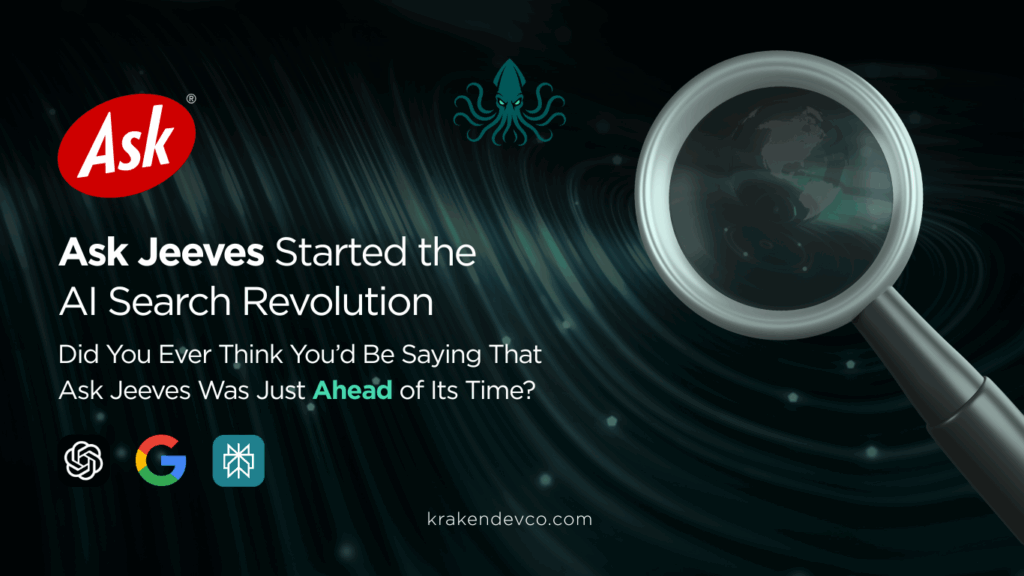
Did You Ever Think You’d Be Saying That Ask Jeeves Was Just Ahead of Its Time?
A Nostalgic Beginning
Did you ever think you’d be saying that Ask Jeeves was just ahead of its time? Launched on 1 June 1997, it billed itself as the first natural language search agent on the Internet, accepting full questions in everyday English rather than keyword strings. According to co-founder David Warthen, each query was matched against a knowledge base of over five million templated questions; unmatched queries prompted users to select from similar variants, while keywords triggered a metasearch across AltaVista (eventually acquired by Yahoo), Excite (eventually acquired by Ask.com), Infoseek and Lycos, and the service’s mascot, a P. G. Wodehouse-inspired butler, was chosen over genies or librarians.
That two-stage process—template matching followed by metasearch, foreshadowed modern hybrid-search architectures and retrieval-augmented generation (RAG) systems, where an initial retrieval pass is refined or re-ranked to supply context-aware results. In February 2006, Ask Jeeves retired its butler persona, rebranding simply as Ask.com while continuing as an answer engine and Q&A platform.
The Chrome Extension Controversy
Fast forward to December 2020, and Ask.com’s owner, IAC, squared off with Google over a suite of Chrome browser extensions. Google removed five IAC extensions for “policy violations”, finding they reset users’ homepages to IAC’s MyWay search and pushed Ask.com ads, actions deemed misleading and promotional rather than functional. Internal audits even recommended “immediate removal and deactivation” after discovering the add-ons failed to deliver promised features and funnelled traffic to IAC properties gadgets360.com. Yet, wary of antitrust optics amid an ongoing US government probe, Google proceeded cautiously, reviewing its enforcement options before deciding on further penalties.
The Dawn of Conversational Search
Ask Jeeves’ original promise, to understand questions phrased as full sentences, has blossomed into today’s conversational search paradigm. Rather than matching isolated keywords, modern engines employ advanced natural language processing (NLP) and machine learning to grasp intent, manage follow-up queries and clarify ambiguities. Users now type queries like, “What’s the best SEO approach for a small UK start-up in 2025?” and receive contextual, tailor-made responses instead of simple link lists.
Key features include:
- Natural Language Input: Queries mirror everyday speech.
- Context Retention: Systems remember earlier interactions to refine answers.
- Clarification Prompts: Engines request details for vague or broad queries.
- Multimodal Responses: Text, images and audio blend in unified answers.
SearchGPT: A Generational Leap
In July 2024, OpenAI introduced SearchGPT, a prototype that merges large language models with live web data to deliver direct, conversational answers. Instead of presenting ranked links, it summarises information, cites sources and invites follow-ups, all within a chat interface. Publishers retain control over how their content appears, ensuring proper attribution and visibility. This marks a pivotal evolution from the “10 blue links” era to an integrated dialogue model.
Enter Perplexity: AI Answers with Receipts
While SearchGPT merges chat with live web data, Perplexity refines the model—offering concise, cited responses built for clarity and trust. Every claim comes with a source. It’s more than a chatbot; it’s a research-grade assistant. Ideal for users who want answers fast, but with the receipts to back them up.
AI and Relevance: The Ranking Revolution
Behind every query, AI drives ranking algorithms that weigh factors such as keyword use, site speed, mobile compatibility and link authority. Machine-learning systems like RankBrain and BERT continuously refine these signals based on user behaviour, filtering spam and prioritising high-quality content. The result is a “universal search” experience blending web links with images, videos, maps and rich snippets.
AI Search Adoption: Complement, Not Replacement
AI-powered search tools have gained traction as complements to, rather than replacements for, classic engines. A survey by Higher Visibility found 71.5 per cent of users have tried AI search tools, though only 14 per cent use them daily. Meanwhile, 79.8 per cent still prefer Google or Bing for general queries, and 20.2 per cent changed their primary search platform within the last year. These trends show that while AI enhances search, traditional engines remain dominant.
Voice Search and the Conversation Continues
Voice assistants like Siri, Alexa and Google Assistant process millions of queries in natural language daily. Voice-activated searches tend to be longer and more conversational, “How can I improve my website’s SEO rankings?” rather than “SEO tips.” To capture this traffic, businesses must:
- Address common questions in a conversational tone.
- Implement FAQ schema markup for featured snippets.
- Keep Google Business Profile details accurate for local voice results.
Strategic Takeaways
Businesses preparing for this AI-driven search landscape should:
- Embrace Conversational Content: Craft FAQs and detailed Q&A sections that mirror how users ask questions.
- Leverage Structured Data: Use schema markup to enable rich results and voice assistant compatibility.
- Optimise Technical Foundations: Ensure fast page loads, mobile-first design and secure connections.
- Monitor AI Referrals: Track engagement through chat and voice interfaces alongside click-through metrics.
From Jeeves to GPT
Ask Jeeves walked so ChatGPT could talk (not literally, of course; that in itself sounds like an AI hallucination), but what started as a digital butler parsing clunky questions has evolved into AI that is somewhat capable of holding entire conversations, provided the information already exists somewhere online, of course. Eventually, the search bar won’t just be a place to type; in fact, it isn’t right now! It’s evolving into a place to talk.
This has put a few things into perspective. Thinking of AI search as my own personal butler seems oddly comforting. I even imagine it in a smart tux, delivering results on a silver tray. (Now who’s hallucinating?) However, the shift isn’t just theatrical; it’s structural. Search is less about links and more about answers. Less about keywords, more about context.
For businesses, the message is clear: structure your content to actually be helpful and provide some value, not something specifically expected to be read by a machine and skimmed by a human. Because increasingly, it’ll be both.
This behaviour is showing us that people want answers faster than ever. Starting your recipe with an in-depth life story of how you discovered a small lemon farm in Spain that gave you the idea to create a tart made entirely from ingredients you can find at the nearest supermarket likely won’t be a great way to structure content. And thank the search engine gods for that! Instead of stuffing content onto your pages, answer questions, provide value and and position your pages as something the bots see as useful.
The butler saw it coming. Might be worth taking a cue.




